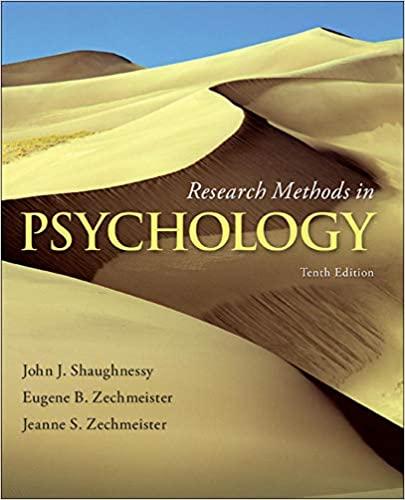Unlike in other chapters, no answers to the Challenge Questions or Stretching Exercises are provided in this
Question:
Unlike in other chapters, no answers to the Challenge Questions or Stretching Exercises are provided in this chapter. To resolve ethical dilemmas, you must be able to apply the appropriate ethical standards and to reach an agreement regarding the proposed research after discussion with others whose backgrounds and knowledge differ from your own. You will therefore have to consider points of view different from your own. We urge you to approach these problems as part of a group discussion of these important issues. The first two challenge questions for this chapter include a hypothetical research proposal involving a rationale and method similar to that of actual published research. To answer these questions, you will need to be familiar with the APA ethical principles and other material on ethical decision making presented in this chapter, including the recommended steps for decision making that were outlined at the end of this chapter. As you will see, your task is to decide whether specific ethical standards have been violated and to make recommendations regarding the proposed research, including the most basic recommendation of whether the investigator should be allowed to proceed.
IRB Proposal Instructions Assume you are a member of an Institutional Review Board (IRB). Besides yourself, the committee includes a clinical psychologist, a social psychologist, a social worker, a philosopher, a Protestant minister, a history professor, and a respected business executive in the community.
The following is a summary of a research proposal that has been submitted to the IRB for review. You are asked to consider what questions you might want to ask the investigator and whether you would approve carrying out the study at your institution in its present form, whether modification should be made before approval, or whether the proposal should not be approved. (An actual research proposal submitted to an IRB would include more details than we present here.)
Rationale College students (women more than men) spend many hours each week on social networking sites, especially Facebook. The present study will investigate predictors of online behavior using the Big Five personality test, which identifies five personality traits: openness to experience, conscientiousness, extraversion, agreeableness, and neuroticism (emotional stability). This wellknown Five-Factor model of personality has been used to predict numerous outcomes, including job performance, psychological well-being, and academic achievement. Recently, the five traits have been used to predict social media use, including number of Facebook contacts and type of Twitter user.
One variation of the Big Five test asks individuals to use a 5-point scale to indicate the extent to which they agree with many different statements about themselves. Sample items associated with the five dimensions are:
• I have a vivid imagination. (Openness)
• I follow a schedule. (Conscientiousness)
• I am the life of the party. (Extraversion)
• I am interested in people. (Agreeableness)
• I get irritated easily. (Neuroticism)
The present study investigates whether the Big Five personality traits can be validly assessed by monitoring the Facebook pages of college students. Specifically, two graduate-student judges will use information from an individual’s Facebook page (e.g., Profile, Timeline, Likes) to rate each user’s personality.
Method Participants will be students enrolled in a large introductory psychology class taught by the principal investigator. Students in the class who use Facebook will be asked to “friend” the instructor so that her teaching assistants can communicate with them (e.g., answer questions, provide messages related to the course, give feedback, announce course-related events). Using a Facebook account set up for this purpose by the instructor, two graduate students will monitor the Facebook pages of students in the class. Monitoring will involve twice-weekly “visits” to the student’s Facebook page over an 8-week period. On each visit, the graduate-student judges will use whatever information is available to rate the students on the Big Five dimensions. Ratings will be adjusted as new information becomes available throughout the 8-week period.
Near the end of the semester students in the psychology class will be asked to take a paper-and-pencil version of the Big Five personality test in class as part of a class discussion on the psychology of personality. Students will be asked to put their names on the test so that the instructor can provide them with the results of the test, which they can interpret based on class discussion of the Big Five traits.
Results from the in-class personality test will be compared with results obtained by the graduate student judges using information from students’
Facebook pages. Data analysis will examine which traits, if any, can be validly assessed using information found on Facebook, and whether both sets of personality ratings predict students’ grades in the class. A positive correlation between the students’ test results and the judges’ ratings would suggest that information found on Facebook pages may provide important ways to assess personality.
If so, additional analyses can be conducted to examine the relationship between personality traits and use of social media.
Step by Step Answer:

Research Methods In Psychology
ISBN: 9780077825362
10th Edition
Authors: John Shaughnessy, Eugene Zechmeister, Jeanne Zechmeister





